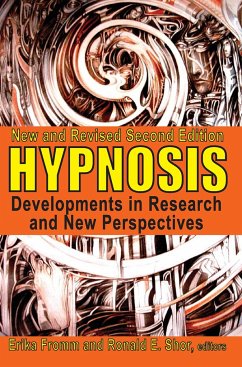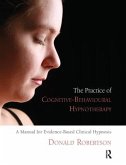- Broschiertes Buch
- Merkliste
- Auf die Merkliste
- Bewerten Bewerten
- Teilen
- Produkt teilen
- Produkterinnerung
- Produkterinnerung
This thorough revision of the first edition, updates and expands, with 25 percent new material, what was generally recognized as a major survey of contemporary scientific research in hypnosis
Andere Kunden interessierten sich auch für
![Hypnosis and Imagination Hypnosis and Imagination]() Robert KunzendorfHypnosis and Imagination55,99 €
Robert KunzendorfHypnosis and Imagination55,99 €![Hypnosis and Imagination Hypnosis and Imagination]() Robert KunzendorfHypnosis and Imagination182,99 €
Robert KunzendorfHypnosis and Imagination182,99 €![Essentials of Hypnosis Essentials of Hypnosis]() Michael D. YapkoEssentials of Hypnosis43,99 €
Michael D. YapkoEssentials of Hypnosis43,99 €![Hypnosis In The Relief Of Pain Hypnosis In The Relief Of Pain]() Ernest R. HilgardHypnosis In The Relief Of Pain62,99 €
Ernest R. HilgardHypnosis In The Relief Of Pain62,99 €![The Practice of Cognitive-Behavioural Hypnotherapy The Practice of Cognitive-Behavioural Hypnotherapy]() Donald J. RobertsonThe Practice of Cognitive-Behavioural Hypnotherapy62,99 €
Donald J. RobertsonThe Practice of Cognitive-Behavioural Hypnotherapy62,99 €![Hypnosis with Children Hypnosis with Children]() Daniel P. KohenHypnosis with Children41,99 €
Daniel P. KohenHypnosis with Children41,99 €![Hypnosis in the Management of Sleep Disorders Hypnosis in the Management of Sleep Disorders]() William C. KohlerHypnosis in the Management of Sleep Disorders36,99 €
William C. KohlerHypnosis in the Management of Sleep Disorders36,99 €-
-
-
This thorough revision of the first edition, updates and expands, with 25 percent new material, what was generally recognized as a major survey of contemporary scientific research in hypnosis
Produktdetails
- Produktdetails
- Verlag: Taylor & Francis Inc
- 2 ed
- Seitenzahl: 810
- Erscheinungstermin: 15. August 2009
- Englisch
- Abmessung: 229mm x 152mm x 43mm
- Gewicht: 1152g
- ISBN-13: 9780202362625
- ISBN-10: 0202362620
- Artikelnr.: 25839009
- Herstellerkennzeichnung
- Libri GmbH
- Europaallee 1
- 36244 Bad Hersfeld
- gpsr@libri.de
- Verlag: Taylor & Francis Inc
- 2 ed
- Seitenzahl: 810
- Erscheinungstermin: 15. August 2009
- Englisch
- Abmessung: 229mm x 152mm x 43mm
- Gewicht: 1152g
- ISBN-13: 9780202362625
- ISBN-10: 0202362620
- Artikelnr.: 25839009
- Herstellerkennzeichnung
- Libri GmbH
- Europaallee 1
- 36244 Bad Hersfeld
- gpsr@libri.de
Ronald E. Shor
I: Theoretical and Historical Perspectives
1: Underlying Theoretical Issues: An Introduction
2: The Fundamental Problem in Hypnosis Research as Viewed from Historic Perspectives
II: New Theories
3: Divided Consciousness in Hypnosis: The Implications of the Hidden Observer
4: The Nature of Hypnosis and Other Altered States of Consciousness: An Ego Psychological Theory 1
5: A Phenomonological Method for the Measurement of Variables Important to an Understanding of the Nature of Hypnosis
III: Surveys of Broad Areas
6: Hypnosis and Sleep: Techniques for Exploring Cognitive Activity During Sleep
7: Hypnosis as a Research Method
8: Suggested ("Hypnotic") Behavior: The Trance Paradigm Versus an Alternative Paradigm
9: Hypnosis and Psychophysiological Outcomes
10: Hypnotic Amnesia
11: Hypnosis and Creativity: A Theoretical and Empirical Rapprochement
12: Hypnosis and the Processes of Imagination
IV: Lines of Individual Research
13: The Effects of Neutral Hypnosis on Conditioned Responses: Implications for Hypnosis as Relaxation
14: Hypnotic Programming Techniques in Psychological Experiments
15: Imaginative and Sensory-Affective Involvements: in Everyday Life and in Hypnosis
16: On the Simulating Subject as a Quasi'Control Group in Hypnosis Research: What, Why, and How
17: Measuring the Depth of an Altered State of Consciousness, with Particular Reference to Self-Report Scales of Hypnotic Depth
V: Individual Research within Specific Areas
18: Humanistic Aspects of Hypnotic Communication
19: Hypnosis and Adaptive Regression: An Ego-Psychological Inquiry 1
20: The Wish to Cooperate and the Temptation to Submit: The Hypnotized Subject's Dilemma
21: Hypnosis as a Means of Studying Cognitive and Behavioral Control
VI: Anticipations for Future Research
22: Quo Vadis Hypnosis? Predictions of Future Trends in Hypnosis Research
1: Underlying Theoretical Issues: An Introduction
2: The Fundamental Problem in Hypnosis Research as Viewed from Historic Perspectives
II: New Theories
3: Divided Consciousness in Hypnosis: The Implications of the Hidden Observer
4: The Nature of Hypnosis and Other Altered States of Consciousness: An Ego Psychological Theory 1
5: A Phenomonological Method for the Measurement of Variables Important to an Understanding of the Nature of Hypnosis
III: Surveys of Broad Areas
6: Hypnosis and Sleep: Techniques for Exploring Cognitive Activity During Sleep
7: Hypnosis as a Research Method
8: Suggested ("Hypnotic") Behavior: The Trance Paradigm Versus an Alternative Paradigm
9: Hypnosis and Psychophysiological Outcomes
10: Hypnotic Amnesia
11: Hypnosis and Creativity: A Theoretical and Empirical Rapprochement
12: Hypnosis and the Processes of Imagination
IV: Lines of Individual Research
13: The Effects of Neutral Hypnosis on Conditioned Responses: Implications for Hypnosis as Relaxation
14: Hypnotic Programming Techniques in Psychological Experiments
15: Imaginative and Sensory-Affective Involvements: in Everyday Life and in Hypnosis
16: On the Simulating Subject as a Quasi'Control Group in Hypnosis Research: What, Why, and How
17: Measuring the Depth of an Altered State of Consciousness, with Particular Reference to Self-Report Scales of Hypnotic Depth
V: Individual Research within Specific Areas
18: Humanistic Aspects of Hypnotic Communication
19: Hypnosis and Adaptive Regression: An Ego-Psychological Inquiry 1
20: The Wish to Cooperate and the Temptation to Submit: The Hypnotized Subject's Dilemma
21: Hypnosis as a Means of Studying Cognitive and Behavioral Control
VI: Anticipations for Future Research
22: Quo Vadis Hypnosis? Predictions of Future Trends in Hypnosis Research
I: Theoretical and Historical Perspectives
1: Underlying Theoretical Issues: An Introduction
2: The Fundamental Problem in Hypnosis Research as Viewed from Historic Perspectives
II: New Theories
3: Divided Consciousness in Hypnosis: The Implications of the Hidden Observer
4: The Nature of Hypnosis and Other Altered States of Consciousness: An Ego Psychological Theory 1
5: A Phenomonological Method for the Measurement of Variables Important to an Understanding of the Nature of Hypnosis
III: Surveys of Broad Areas
6: Hypnosis and Sleep: Techniques for Exploring Cognitive Activity During Sleep
7: Hypnosis as a Research Method
8: Suggested ("Hypnotic") Behavior: The Trance Paradigm Versus an Alternative Paradigm
9: Hypnosis and Psychophysiological Outcomes
10: Hypnotic Amnesia
11: Hypnosis and Creativity: A Theoretical and Empirical Rapprochement
12: Hypnosis and the Processes of Imagination
IV: Lines of Individual Research
13: The Effects of Neutral Hypnosis on Conditioned Responses: Implications for Hypnosis as Relaxation
14: Hypnotic Programming Techniques in Psychological Experiments
15: Imaginative and Sensory-Affective Involvements: in Everyday Life and in Hypnosis
16: On the Simulating Subject as a Quasi'Control Group in Hypnosis Research: What, Why, and How
17: Measuring the Depth of an Altered State of Consciousness, with Particular Reference to Self-Report Scales of Hypnotic Depth
V: Individual Research within Specific Areas
18: Humanistic Aspects of Hypnotic Communication
19: Hypnosis and Adaptive Regression: An Ego-Psychological Inquiry 1
20: The Wish to Cooperate and the Temptation to Submit: The Hypnotized Subject's Dilemma
21: Hypnosis as a Means of Studying Cognitive and Behavioral Control
VI: Anticipations for Future Research
22: Quo Vadis Hypnosis? Predictions of Future Trends in Hypnosis Research
1: Underlying Theoretical Issues: An Introduction
2: The Fundamental Problem in Hypnosis Research as Viewed from Historic Perspectives
II: New Theories
3: Divided Consciousness in Hypnosis: The Implications of the Hidden Observer
4: The Nature of Hypnosis and Other Altered States of Consciousness: An Ego Psychological Theory 1
5: A Phenomonological Method for the Measurement of Variables Important to an Understanding of the Nature of Hypnosis
III: Surveys of Broad Areas
6: Hypnosis and Sleep: Techniques for Exploring Cognitive Activity During Sleep
7: Hypnosis as a Research Method
8: Suggested ("Hypnotic") Behavior: The Trance Paradigm Versus an Alternative Paradigm
9: Hypnosis and Psychophysiological Outcomes
10: Hypnotic Amnesia
11: Hypnosis and Creativity: A Theoretical and Empirical Rapprochement
12: Hypnosis and the Processes of Imagination
IV: Lines of Individual Research
13: The Effects of Neutral Hypnosis on Conditioned Responses: Implications for Hypnosis as Relaxation
14: Hypnotic Programming Techniques in Psychological Experiments
15: Imaginative and Sensory-Affective Involvements: in Everyday Life and in Hypnosis
16: On the Simulating Subject as a Quasi'Control Group in Hypnosis Research: What, Why, and How
17: Measuring the Depth of an Altered State of Consciousness, with Particular Reference to Self-Report Scales of Hypnotic Depth
V: Individual Research within Specific Areas
18: Humanistic Aspects of Hypnotic Communication
19: Hypnosis and Adaptive Regression: An Ego-Psychological Inquiry 1
20: The Wish to Cooperate and the Temptation to Submit: The Hypnotized Subject's Dilemma
21: Hypnosis as a Means of Studying Cognitive and Behavioral Control
VI: Anticipations for Future Research
22: Quo Vadis Hypnosis? Predictions of Future Trends in Hypnosis Research









